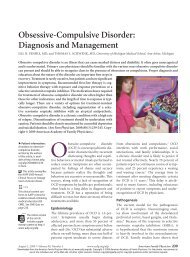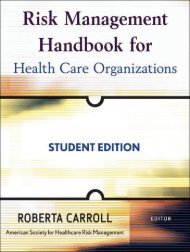Health Information Management: Integrating Information Technology ...
Health Information Management: Integrating Information Technology ...
Health Information Management: Integrating Information Technology ...
Create successful ePaper yourself
Turn your PDF publications into a flip-book with our unique Google optimized e-Paper software.
WAITING FOR GODOT 33<br />
different HIS systems can talk to each other or to GP information systems, for<br />
example.<br />
This situation becomes even more complicated because many hospitals are<br />
still dependent on HIS systems which date from the early 1980s. Such so-called<br />
‘legacy systems’ are typified by poor user-interfaces, are monolithic and hard or<br />
impossible to couple to other information systems, and are increasingly difficult<br />
to maintain. On the other hand, they have developed over long time-periods,<br />
have become an integrated part of an organization’s functioning, and are very<br />
expensive to replace. In many situations, thus, more or less improvisatory<br />
connections are made to link legacy systems to more modern, state of the art<br />
modules that add to or take over part of the functions of the legacy system<br />
(ibid.). In this way, many Electronic Patient Records are now evolving: as a thin,<br />
graphic-oriented layer that looks very modern, but in fact lies on top of (a)<br />
decades old information system(s).<br />
In 1997, the Institute of Medicine published an update of their report, stating<br />
that progress has not been all that successful. <strong>Health</strong> care organizations have<br />
invested less than they could have; governments have failed to take action on<br />
eliminating legal obstacles (such as the requirement to keep a ‘paper archive’, or<br />
to have signatures ‘in ink’) or to supply the necessary funding, and the lack of<br />
standards hinders further development. The developments between countries are<br />
hardly converging: due to the differences between health care systems, the<br />
prevalence of locally developed legacy systems and the local ties of vendors, a<br />
‘global’ EPR market is virtually non-existent.<br />
In addition, many health care ICT development and implementation projects<br />
still fail. <strong>Health</strong> ICT constantly seems to promise more than it can deliver. EPRs<br />
are promised but not delivered, vendors discontinue support for existing systems,<br />
or implementation projects run to the ground. In France, the 1999 opening of the<br />
‘hospital of the future’, Hôpital Européen George Pompidou in Paris, turned into<br />
a nightmare when the ‘paperless environment’ failed to function. The robots in<br />
the operating theatres appeared too complicated to use, the EPR was impossible<br />
to use, and critics calculated that trying to order medications through the system<br />
was 1,000 per cent slower than with the ordinary, paper-based systems.<br />
Overnight, paper-based records had to be printed and put into use, although the<br />
hospital had proudly been built without any archive space or other logistical<br />
support for paper records. In the Netherlands, meanwhile, millions of Euros were<br />
spent on developing a ‘health card’, using chipcard technology, which would<br />
provide an infrastructure for administrative (insurance) data, and develop further<br />
into a basic health care information carrier. After years of promises,<br />
technological problems and political fights about who would pay what, and who<br />
would do what for who, the project was declared ‘dead’ in 2002. Similarly, the<br />
UK has its infamous failure cases, such as the Wessex <strong>Health</strong> Authority<br />
Regional <strong>Information</strong> System, cancelled in 1990 after spending more than £20<br />
million, and the national Hospital <strong>Information</strong> System projects, started in the<br />
1980s that cost over £32 million and have yielded only minimal results. When











